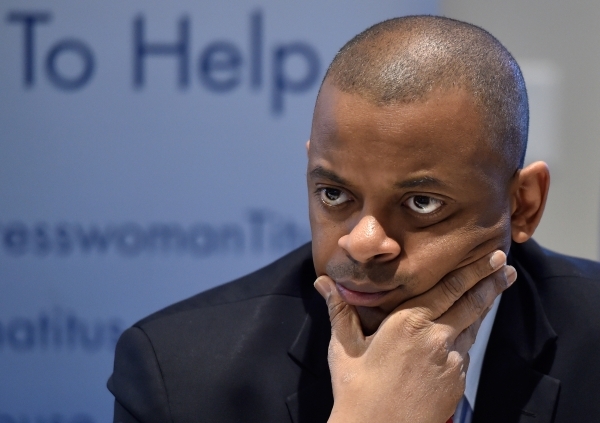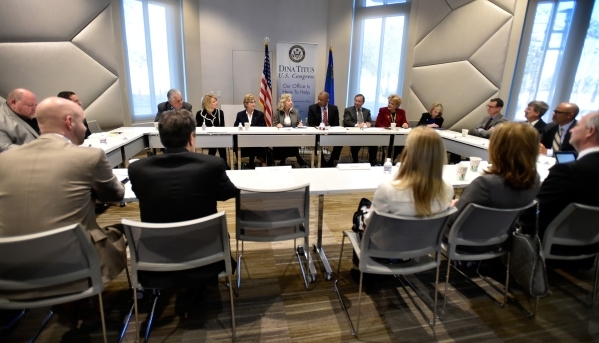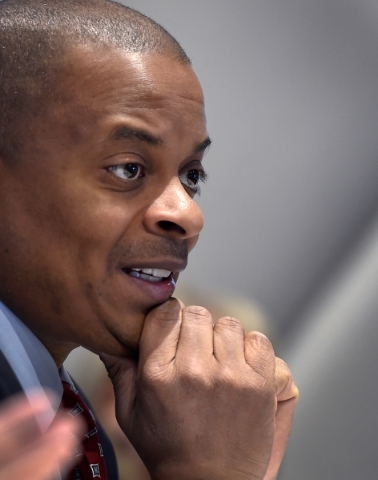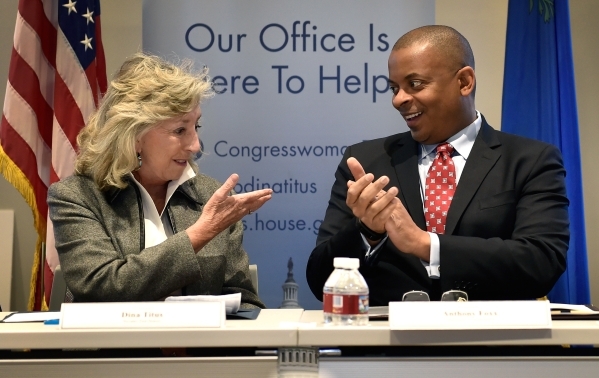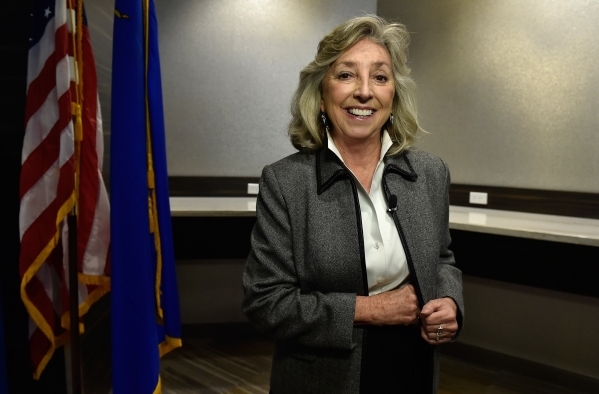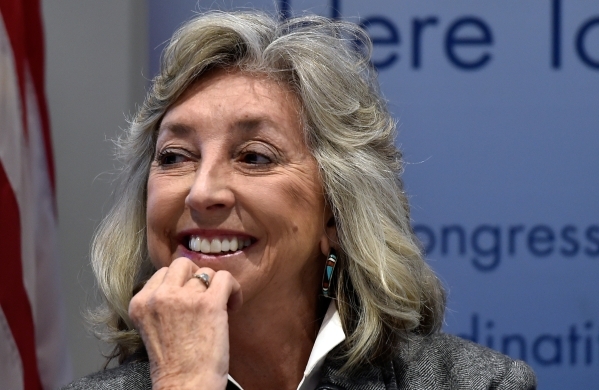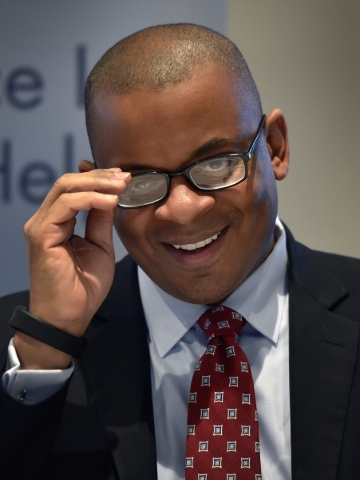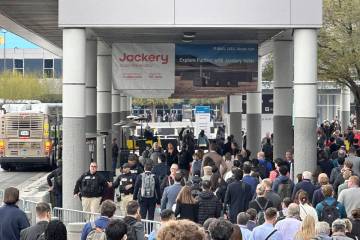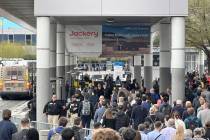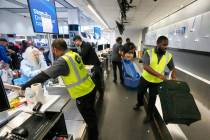Transportation chief — sans hoverboard — urges consensus on traffic plans
Transportation Secretary Anthony Foxx said he would have preferred getting around in a more modern mode of transportation when confronted with the annual traffic nightmare that accompanies CES.
Asked whether he would have liked to have used light rail to get in and out of the Las Vegas Convention Center area when he appeared on a panel at CES on Thursday, Foxx quipped, "No, maybe a hoverboard."
Las Vegas Convention and Visitors Authority President and CEO Rossi Ralenkotter said this week was the perfect time for Foxx to be in Las Vegas, when more than 170,000 people are attending the city's largest annual convention.
Foxx, who as mayor of Charlotte, N.C., guided that city's development of a light-rail system, met with Southern Nevada transportation leaders Friday on a wide range of mobility topics. Foxx encouraged those attending to continue to develop plans public policy makers can encourage the community to back
'Growing pains'
"The growing pains of a growing economy with population growth are probably not going away so it's critical to have business leadership and political leadership coming together to try to sort out a plan for Las Vegas," Foxx said in an interview following the one-hour transportation roundtable.
The session was organized by Rep. Dina Titus, D-Nev., at the Las Vegas Metro Chamber of Commerce office at the Smith Center.
Two organizations comprised of elected officials and business leaders are in the midst of transportation planning and will present their findings to public bodies later this year.
The Regional Transportation Commission of Southern Nevada's 2,365-page Transportation Investment Business Plan, drafted after two years of meetings by a committee organized by Ralenkotter, proposes 65 recommendations. They range from additional pedestrian walkways and overpasses along the Strip, a series of street improvements that enhance traffic movement and a light-rail system that would carry passengers from McCarran International Airport to the resort corridor along the Strip and to downtown Las Vegas.
The RTC board of directors has already heard the presentation on the report and it's scheduled to be seen by the Convention and Visitors Authority board of directors on Tuesday. Later this month, members of the state's Southern Nevada Tourism Infrastructure Committee will hear about it. That committee is not only dealing with transportation matters, but also proposals involving the expansion of the Las Vegas Convention Center and the need for a new stadium.
The RTC and the LVCVA boards include members of the Clark County Commission and the city councils of the valley's municipalities. The Southern Nevada Tourism Infrastructure Committee was formed by Gov. Brian Sandoval and will issue a report to him by the end of the summer.
Representatives of all those groups attended Friday's session with Foxx.
Gaining an edge
One of the key questions attendees asked the transportation secretary: When requesting federal funding for some of the big-ticket projects, how can Southern Nevada get an edge in its request to rise above those from other cities?
President Obama signed the Fixing America's Surface Transportation Act — the first long-term transportation spending legislation approved by Congress in 10 years — last month. That means there will be FAST Act grant money and Transportation Investment Generating Economic Recovery discretionary grants available to help pay for some of Southern Nevada's transportation needs.
Among the key takeaways from Foxx:
— The public-private partnerships that have been established with Ralenkotter's transportation committee and the Southern Nevada Tourism Infrastructure Committee should help Southern Nevada's bid for funds because it demonstrates that both business people and elected officials are in agreement on a plan.
— The plan's strategy for developing connected, integrated and intermodal systems is viewed as a positive. Plans are considering mass transit to move large volumes of people to the city's resort corridor, expanded and modified roads to better manage automobile traffic, improvements to aid the taxi and ride-hailing companies that move visitors around town and pedestrian area improvements for visitors who like to walk along the Strip.
— Foxx urged local officials to move with haste. He said one of the reasons the Charlotte light-rail system was so successful is that once the plan was implemented, efforts were made to begin work immediately. The reason, he said, is that the public tends to lose confidence in a plan if it doesn't see immediate progress toward implementation. In Charlotte, the light-rail system survived a referendum vote to shut the project down. "The key," he said, "is getting something in the ground."
— The state and the Clark County Commission's willingness to implement the three-year fuel revenue indexing gasoline tax on residents should play well in convincing the federal government to award transportation grants to Southern Nevada. The current program has enabled $1 billion in bonding for local transportation projects and more than 700 of them have been announced or are underway. It's viewed as local support for transportation projects and a willingness to share the cost burden. That's why the public will likely see a major campaign to extend fuel revenue indexing later this year when a 10-year extension is placed on the ballot for voters to consider in November.
— Aviation was also in the conversation. Ralenkotter urged Foxx's support for open-skies agreements that would enable more flights to and from international destinations. He also advocated for implementation of a next-generation air traffic control system that would make the skies safer and more efficient, allowing aircraft to land and take off in more efficient patterns. The reauthorization of the Federal Aviation Administration is also high on Foxx's to-do list. He noted that the privatization of the air traffic control system is a key issue that needs to be resolved. Foxx also met separately with representatives of unmanned aerial system companies that urged the speedy implementation of regulations to enable commercial drone flying.
— Participants urged Foxx to support the expedited funding of construction for the Interstate 11 project. Titus is a key member of a two-state bipartisan committee working with legislative leaders from Arizona on its portion of the I-11 project. Contracts have already been awarded and construction has begun on I-11 in Nevada, a 15-mile bypass of Boulder City that extends from the Mike O'Callaghan-Pat Tillman Memorial Bridge over the Colorado River to U.S. Highway 95 near Railroad Pass.
Foxx believes Nevada officials are on the right track in their efforts to get federal funding for its projects.
"The reality is, a transportation system has to work for the everyday person and it has to work for business," Foxx said. "If the public gets it, the public will get behind it. I have a lot of confidence that they're doing it right and we're going to try to help them."
Contact reporter Richard N. Velotta at rvelotta@reviewjournal.com or 702-477-3893. Find @RickVelotta on Twitter.
The Regional Transportation Commission of Southern Nevada has 65 proposed recommendations in its Transportation Investment Business Plan. Here are some of them:
— A light-rail system connecting McCarran International Airport with the Strip and downtown Las Vegas. Locations of stops and whether the route would be above, below or at grade hasn’t been determined.
— A new multimodal transportation center near McCarran.
— The extension of the Las Vegas Monorail south to Mandalay Bay and the addition of a new monorail stop near the Sands Expo and Convention Center.
— The transformation of Maryland Parkway to a “complete street” with a transit line — possibly a light rail — bicycle lanes and landscaping to support mixed-use street frontage.
— Construction of a pair of elevated one-way couplets to McCarran on Koval Lane and Tropicana Avenue and from McCarran on Swenson Street.
— Seven new pedestrian bridges over the Strip, including a circular structure at Sahara Avenue and an arced X-shaped bridge with landings near The Cosmopolitan of Las Vegas, Bellagio, Paris Las Vegas and Planet Hollywood.
— The widening of Strip sidewalks and construction of some elevated pedestrian walkways to carry pedestrians over some resort driveways.
— A “complete street” makeover for Harmon Avenue, Convention Center Drive and Riviera Boulevard.
— The widening of Koval Lane, Giles Street and Reno Avenue along the periphery of McCarran.
— A trolley circulator transit line serving downtown Las Vegas.
— The formation of a Resort Corridor Mobility Association to recommend new transportation projects.
— New U.S. Highway 95 exits at Maryland Parkway and City Parkway.
— Development of a wayfinding navigation system for tourists.
— New high-capacity transit — that could be light rail, bus rapid transit or regional express routes — on Maryland Parkway north and south, Flamingo Road and Charleston Boulevard east and west, North Fifth Street to the north, Valley View Boulevard and U.S. Highway 95, Las Vegas Boulevard South to Blue Diamond Road and the entire Las Vegas Beltway.
— New park-and-ride facilities at Downtown Summerlin, the 215 Beltway and Flamingo Road, the 215 Beltway and South Decatur Boulevard (Beltway Business Park), North Fifth Street and Centennial Parkway, and at Meadows mall.



